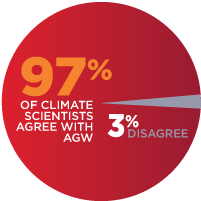Averting anxiety with cosmic connectivity: magical thinking
| Can you influence your future with your mental attitude, or is that a red flag? |
How to recognise this tactic
Magical thinking is present when anyone argues that everything is connected: thoughts, symbols and rituals can have distant physical and mental effects; inanimate objects can have intentions and mystical influences. Often, the connectivity is supposedly mediated by some mysterious energy, force or vibration and there is much talk of holism, resonance, balance, essences and higher states.
Some people think of magical thought as an open invitation to unrestrained supernatural indulgence while others think of magical thought as a subjectively enjoyable cognitive illusion with numerous undesirable side effects.
Kevin J. McCaffree, American sociologist, 2012
Why do people use this tactic?
We all employ magical thinking to some extent, and probably can’t escape it entirely. It seems to be an evolutionary adaptation that allows us to feel in control when we are confronted by threats that we don’t know how to deal with. By calling on supposedly magical processes, we feel as though we are doing something to counter the threat. This can remove the stress and anxiety that would otherwise cause us to break down in those circumstances, allowing us to function more effectively. The tactics people use range from crossing fingers for luck, to ESP, to travelling to another continent to be in the presence of a magically healing relic.
What’s wrong with this tactic
Magical thinking is the foundation of superstitions. In the days when humans had very little understanding of the real world, it may have been an advantage to engage superstitions. They allowed people to remain unfazed by anxiety when confronted by incomprehensible dangers. But there is no evidence that any superstitions have any other effect at all. With our present state of knowledge, most threats can be dealt with rationally because we understand their causes and know how to mitigate them. Using superstitions or magic instead of tested techniques that would have worked can be disastrous.
And purveyors of bogus science can use our propensity for magical thinking to deceive us. They may try to convince us that they can provide tools that give us access to magic – crystals, potions, rituals, power bands, icons, treatments, belief systems and so on. These tools are never supported by evidence from real-world tests. Sometimes they are harmless. But when they delay or replace rational, tested solutions, they can cause untold harm.
What to do when confronted by this tactic
It’s important to recognize that we are all tempted to think magically and to guard against it. Many people are comfortable with magical thinking existing in their mental processes simultaneously with rational thinking. Learn to recognize this and, when you are dealing with a problem that has perfectly good rational solutions, banish the magical thinking. Realize that some people may try to encourage your magical thinking to re-emerge for their own benefit.
Variations and related tactics
Promoters of magical thinking recruit as many pseudoscientific techniques, cognitive biases and logical fallacies as they can. Among the favourites are reliance on anecdotal evidence, appeals to authority and ancient wisdom, false dichotomy, wishful thinking, technobabble, rooster syndrome, apophenia, esoteric energy and misapplication of scientific models.
Examples
- Here’s a video that shows all the hallmarks of magical thinking:
- Cancer remains one of the threats that cannot always be averted by science, so it’s no surprise that the purveyors of magical thinking abound in that field. Here’s a review of some of the ‘remedies’, and a post from Science-Based Medicine describing what can happen when proper medical treatment for breast cancer is rejected.
- Here’s an extract with copious magical thinking from a website promoting crystal healing:
Cancer comes in many shapes and forms and it is becoming all too common. What I have noticed is, cancer is really about us holding back our energy, our creative power, the ‘real’ us that wants to do more but we feel we can’t for many different reasons. We hold back for so long we shut down our light, slowly over time.
Energetically, it is stagnant or blocked energy. It often appears black to me, where there should be light or a colour. Putting light back in and opening the flow into the area is what needs doing. Doing the thing you really want to do, often comes to the forefront as the energy starts to flow into the area. DO IT!! You’ll feel free and often just doing ‘the thing’ makes the world of difference – literally.
Healing stones I recommend are those that increase the energy flow, allowing more light to pass to the area. Stones that regenerate the cells, purify the mind / body, restructure DNA (so the dis-eased cells can go back to normal) create balance and stability by grounding the healing energy into the person’s aura.
Needless to say, this is complete nonsense. Crystals have no supernatural properties, and there is no evidence showing they can cure cancer by any means. Encouraging their use as a cancer treatment is irresponsible.
- So called psychics and channelers rely heavily on their clients’ tendency towards magical thinking. In this video, Miklos Jako analyses a session with “channeler” James Van Praagh. Jako demonstrates how Van Praagh uses cold and hot reading techniques to delude the client into believing he has paranormal powers.
- Update 2013/08/11: Here’s Martin Pribble’s story telling how he desperately wanted to believe in all sorts of magic, but eventually found that the real world is much more exciting.
Further reading
What is magical thinking and do we grow out of it? at The Conversation.
Why do so many people believe in psychic powers? at BPS Research Digest.
Kevin J. McCaffree’s quote is from Is Magical Thinking Good? at eSKEPTIC.
The Wicca jewellery photo is by Midnightblueowl from Wikipedia.
Many of the ideas in this post stem from a paper by D. Thomas Markle: The magic that binds us: magical thinking and inclusive fitness.
| This is one of ScienceOrNot’s Science red flags. See them all here. |
Updated 2013/08/11










All very sound stuff, Graham, except possibly your dismissal of holism: I think holism (or holistic thinking – see link below) is on the border between the rational and the irrational – as is James Lovelock’s Gaia hypothesis. Clearly, I do not believe in some kind of Pachamama-style Earth Mother; and neither am I some kind of animist or pantheist… I merely accept that the Earth is a self-regulating system that humanity has now succeeded in destabilising (like a gyroscope given such a big knock that it cannot right itself).
http://www.environment.gen.tr/holistic-view/111-what-is-holism.html
Actually, looking at that website, you may be right! If the choice is between holism and reductionism, I am in favour of the latter. Holistic thinking is OK if it is an appeal to people to consider the whole (not just part) of a system; but holistic thinking is not OK if it is an appeal to people to believe that there is something inexplicable or unscientific happening…
I certainly didn’t intend to appear to be dismissing holism, Martin. My view of the concept corresponds closely with yours. What I intended was to convey was that pseudoscientists use the term in the same way that they use ‘energy’, ‘balance’, ‘vibration’ etc.
(I’m just busy reading this blog backwards so I realise this isn’t the most recent topic)
Firstly, I agree 100% with virtually everything in this post, and the rest of your blog for that matter! I have something I wanted to add to this post though… you can probably title this comment “In Defense Of Magical Thinking … Sort Of”.
You said, in part:
I agree with that as stated. But on the other hand most of my problems don’t have always-available rational solutions that are within my abilities to implement – and I think the same is true for most people. When a situation does have a good practical rational solution it’s not one of the things that keeps me up at nights because I will already have solved it or at least created a plan of action and begun to take steps towards solving it. The things that keep me up worrying are things like my friends stuck living in a warzone in Pakistan, my flatmate who is trying to deal with an unpredictably-changing government bureaucracy which functions almost as a black-box, my own incurable rare diseases, and my concerns about what the future will bring.
These are problems where I have a very small (or zero) ability to affect meaningful changes. I do all the things that I can do, and then I think magically basically because it makes me feel better! I’m perfectly aware that I’m thinking magically and that the only thing affected is my own psyche, but since I make sure that I’ve done all the practical stuff first my own psyche is the only thing left that I can affect.
For me, magical thinking seems to work like optical illusions do – even when you know how an optical illusion works and you know why it’s illusory you can still see it. For me, even when I know all the science behind magical thinking and I’m 100% aware that the only thing affected is my own psychology it still makes me feel better to cross my fingers for good luck, ask “the universe” to look after my friends, touch wood to avoid bad luck, avoid saying things out loud in fear of “jinxing” reality, and probably some others I can’t remember right now. I try to be conscious about it (and not obsessive!) and make sure that I don’t pick up any magical thinking that has any significant negative effect on reality – I’m not going to stay home from my medical appointments on Friday the 13th or anything! But small things like I described don’t seem likely to have any negative effects that are significant and even when done with the full knowledge that they don’t “work” they still make me feel better… and feeling better is a totally valid reason for doing something.
I think this is an important part of the topic because I think that when those who are questioning skepticism/science/etc. read articles like this they feel like you’re trying to rip their “emotional crutches “out from under them and not providing any replacements. I want to point out that it’s totally OK to have emotional crutches just as long as you are aware that they’re crutches and you don’t use them as an excuse to fall down on changing the things that you can change. I hope this makes sense to you!
Beautifully put, Jeshyr. You’ve nailed it perfectly. I don’t think anyone can banish magical thinking entirely.
I’d add only one other proviso. It’s totally OK to have emotional crutches as long as you are aware that they’re crutches and you don’t try to pass them off as reality to those for whom you have a duty of care.
Absolutely!! Not passing them off as reality to others comes under a more general “try to avoid lying” rule in my brain I guess, because it never occurred to me to mention it when I wrote that, but it’s definitely worth pointing out specifically in a context like this.